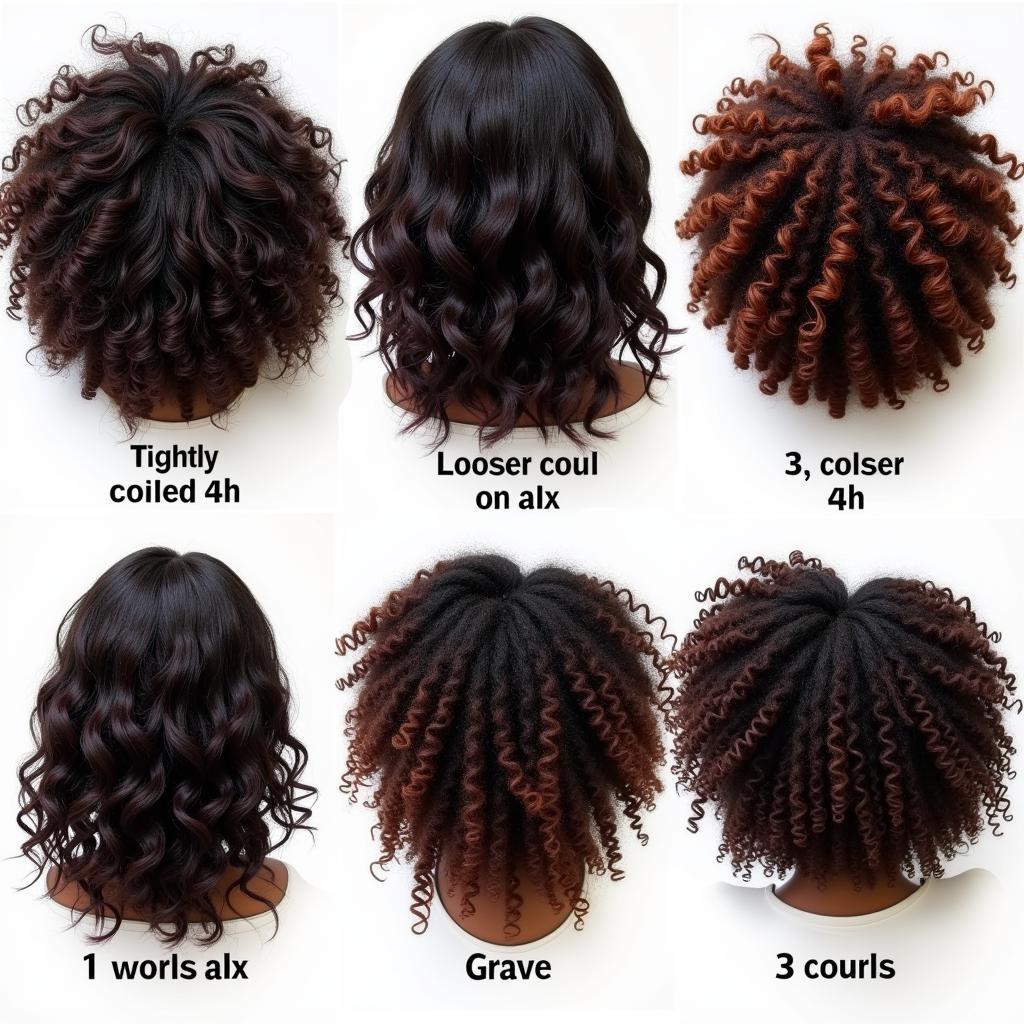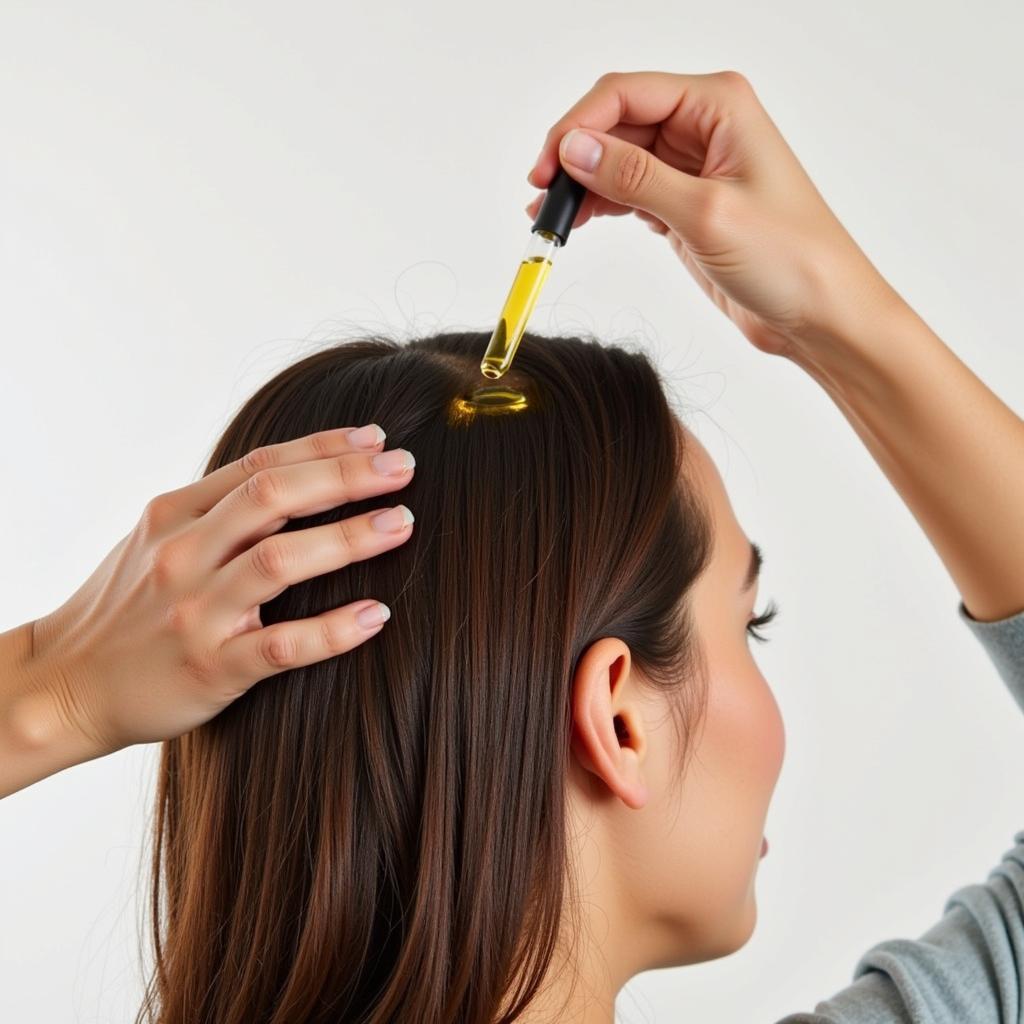The Ultimate Guide to African American Hair Growth Oil
African American Hair Growth Oil is a popular choice for those looking to achieve long, healthy, and luscious locks. But with so many options available, it can be challenging to know where to begin. This guide delves into the world of hair growth oils, exploring their benefits, ingredients, and how to choose the best one for your hair type.
Understanding African American Hair
African American hair is unique and requires special care. Characterized by its tight curls and coils, this hair type is often prone to dryness, breakage, and slower growth rates. The shape of the hair follicles can make it difficult for sebum, the natural oil produced by the scalp, to travel down the hair shaft, leading to moisture loss. This is where hair oils come into play.
 African American Hair Types
African American Hair Types
The Power of Hair Growth Oil
Hair growth oils can provide a much-needed moisture boost, strengthen hair strands, and promote a healthy scalp environment for optimal growth. These oils work by:
- Sealing in moisture: Oils create a protective barrier on the hair shaft, preventing moisture loss and keeping hair hydrated.
- Strengthening hair strands: Some oils are rich in fatty acids and vitamins that penetrate the hair shaft, improving elasticity and reducing breakage.
- Stimulating the scalp: Certain oils possess properties that can increase blood flow to the scalp, potentially promoting hair growth.
Key Ingredients to Look For
Navigating the world of hair growth oils can feel overwhelming with countless brands and ingredients. Here are some key ingredients to look for:
- Castor Oil: Known for its thick consistency, castor oil is rich in ricinoleic acid, which is believed to promote hair growth and reduce scalp inflammation.
- Jojoba Oil: Closely mimicking the scalp’s natural sebum, jojoba oil moisturizes without clogging pores and can help balance oil production.
- Coconut Oil: A popular choice for its ability to penetrate the hair shaft, coconut oil strengthens hair and reduces protein loss.
- Avocado Oil: Packed with vitamins A, D, and E, avocado oil nourishes the scalp and adds shine to dull hair.
- Tea Tree Oil: With its antibacterial and antifungal properties, tea tree oil can soothe scalp conditions and promote a healthy environment for hair growth.
Choosing the Right Oil for You
Selecting the best African American hair growth oil depends on your specific hair needs and concerns.
- For dry hair: Look for oils like shea butter, coconut oil, or avocado oil for intense moisture.
- For breakage: Opt for oils rich in strengthening properties like castor oil, jojoba oil, or almond oil.
- For scalp health: Consider oils with antibacterial and antifungal benefits like tea tree oil, rosemary oil, or peppermint oil.
 Applying Hair Growth Oil to African American Hair
Applying Hair Growth Oil to African American Hair
Incorporating Hair Growth Oil into Your Routine
For best results, apply your chosen hair oil to clean, damp hair. Gently massage the oil into your scalp and work it through to the ends. You can use it as a pre-shampoo treatment, a leave-in conditioner, or a hot oil treatment.
Beyond the Bottle: Other Factors Affecting Hair Growth
While hair growth oils can be incredibly beneficial, it’s important to remember that they are not a miracle cure. Several other factors can impact hair growth, including:
- Genetics: Your genetic makeup plays a significant role in determining your hair growth rate.
- Diet: A balanced diet rich in vitamins and minerals is crucial for healthy hair growth.
- Stress: High stress levels can contribute to hair loss or slowed growth.
- Haircare Practices: Over-styling, heat damage, and harsh chemicals can damage hair and hinder growth.
Conclusion
Finding the right African American hair growth oil can be a game-changer for achieving the healthy, vibrant hair you desire. By understanding the unique needs of your hair type and choosing the right ingredients, you can nourish your scalp, strengthen your strands, and promote optimal hair growth. Remember to be patient and consistent with your hair care routine, and don’t hesitate to consult a dermatologist or trichologist if you have any concerns about hair loss or scalp conditions.
FAQs About African American Hair Growth Oil
1. Can I use hair growth oil every day?
While it’s generally safe to use hair oil daily, it depends on your hair type and the oil you choose. Start with a few times a week and adjust based on your hair’s needs.
2. How long does it take to see results with hair growth oil?
Hair growth is a gradual process, and results vary from person to person. It’s essential to be patient and consistent with your routine. You may start noticing improvements in your hair’s overall health and appearance within a few weeks, while significant growth may take several months.
3. Can I use hair growth oil if I have a sensitive scalp?
It’s crucial to choose oils known for their gentle and soothing properties, such as jojoba oil or almond oil. Always perform a patch test before applying any new oil to your entire scalp.
4. Is it necessary to wash my hair after using hair growth oil?
Whether you need to wash your hair after using hair growth oil depends on the type of oil and how much you apply. Some oils, like jojoba oil, are lightweight and can be used as a leave-in treatment. However, heavier oils like castor oil are best used as a pre-shampoo treatment or washed out after a few hours.
5. Can hair growth oil help with hair loss?
While hair growth oils can promote a healthy scalp environment and potentially support hair growth, they are not a guaranteed solution for hair loss. If you’re experiencing excessive hair loss, consult a medical professional to determine the underlying cause.
Need further assistance with your hair care journey? Contact us at +255768904061, email us at [email protected], or visit us at Mbarali DC Mawindi, Kangaga, Tanzania. Our dedicated customer care team is available 24/7 to assist you.
Explore more insights on African American hair care:
- Discover the vibrant world of african american hair color.
- Unlock the secrets to african american natural hair care.
- Gain valuable knowledge on african american male puberty and hair care.
- Embrace the beauty of african american natural curly hair.
- Explore options for african american hair transplant turkey if you’re considering hair restoration.
